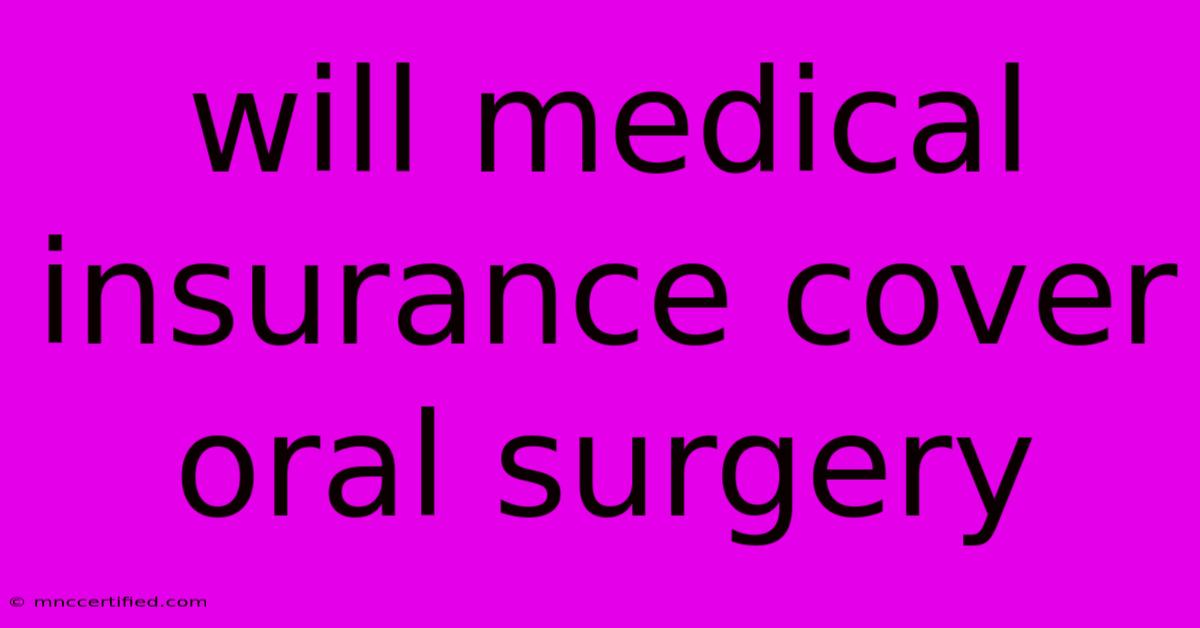Will Medical Insurance Cover Oral Surgery

Table of Contents
Will Medical Insurance Cover Oral Surgery? A Comprehensive Guide
Oral surgery can be a significant expense, and many people rely on medical insurance to help cover the costs. But does your medical insurance actually cover oral surgery? The answer is: it depends.
While dental insurance is the primary coverage for oral procedures, certain circumstances might allow your medical insurance to contribute to the cost of your oral surgery. This article will delve into the factors that determine whether medical insurance will cover your oral surgery, helping you understand your options and navigate this complex landscape.
When Medical Insurance Might Cover Oral Surgery
Your medical insurance might cover oral surgery in cases where the procedure is medically necessary and directly related to a covered medical condition.
Here are some examples:
- Trauma and Injuries: If you experience a fracture or severe injury to your jawbone due to an accident, your medical insurance might cover the necessary oral surgery to repair the damage.
- Oral Cancer Treatment: Oral cancer treatment often involves oral surgery to remove cancerous tissue, and your medical insurance may cover these procedures.
- Bone Grafting for Dental Implants: If you need bone grafting to prepare your jawbone for dental implants due to bone loss from periodontal disease or other medical conditions, your medical insurance might cover the procedure.
- Congenital Conditions: Some individuals are born with congenital conditions affecting their jaw structure, which might require oral surgery. Your medical insurance could cover these surgeries if they are deemed medically necessary.
Factors Influencing Medical Insurance Coverage
Several factors play a role in determining whether your medical insurance covers oral surgery:
- Policy Coverage: Review your insurance policy carefully to understand the specific coverage for oral procedures. Some plans might exclude oral surgery altogether, while others might offer limited coverage for specific conditions.
- Pre-existing Conditions: Your medical insurance might cover oral surgery related to a pre-existing condition if the procedure is deemed medically necessary for managing the condition.
- Medical Necessity: The most crucial factor in determining coverage is whether the oral surgery is considered medically necessary. Your dentist or surgeon needs to provide detailed documentation and justification for the procedure to your insurance company.
- Procedure Type: Specific oral surgery procedures might have different coverage limitations. For example, routine dental procedures like tooth extractions might not be covered by medical insurance.
Tips for Maximizing Coverage
Here are some practical tips to enhance your chances of getting your oral surgery covered by medical insurance:
- Consult Your Dentist: Discuss your insurance coverage with your dentist before proceeding with the surgery. They can provide guidance on the most appropriate course of action and help you understand the process.
- Seek Pre-authorization: Before scheduling surgery, seek pre-authorization from your insurance company to ensure coverage and avoid unexpected out-of-pocket costs.
- Gather Necessary Documentation: Ensure your dentist provides detailed medical documentation to support the medical necessity of the procedure.
- Review Your Policy: Regularly review your insurance policy to stay informed about any changes or coverage limitations.
Alternatives to Medical Insurance
If your medical insurance doesn't cover your oral surgery, consider alternative options:
- Dental Insurance: Dental insurance is designed specifically to cover oral procedures, including oral surgery.
- Payment Plans: Your dentist might offer payment plans or financing options to make the procedure more affordable.
- Crowdfunding: Platforms like GoFundMe can help you raise funds for your oral surgery from family, friends, and the community.
Conclusion
Determining whether your medical insurance will cover oral surgery requires a thorough understanding of your policy, the medical necessity of the procedure, and the specific coverage limitations. By carefully reviewing your options and following the tips outlined above, you can increase your chances of maximizing your coverage and accessing the necessary care you need. Remember, seeking guidance from your dentist and insurance company is essential to navigating this complex landscape.

Thank you for visiting our website wich cover about Will Medical Insurance Cover Oral Surgery. We hope the information provided has been useful to you. Feel free to contact us if you have any questions or need further assistance. See you next time and dont miss to bookmark.
Featured Posts
-
Insurance Depot In Port Charlotte Florida
Nov 07, 2024
-
The View Hosts Express Dismay At Trump Win
Nov 07, 2024
-
3rd Odi Live West Indies Vs England Cricket
Nov 07, 2024
-
Championship Leeds Draw 0 0 At Millwall
Nov 07, 2024
-
Health Insurance Responsibility Disclosure
Nov 07, 2024